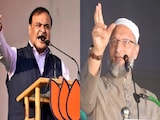- US tariffs partly stem from Trump's displeasure over India's rejection of his peace role with Pakistan
- Trump views BRICS as anti-US and opposes India's membership due to concerns about an alternative currency
- India denies Trump's role in India-Pakistan ceasefire, which was directly mediated by military officials
One of the reasons behind Washington's punitive tariffs on New Delhi is that US President Donald Trump is miffed with India for ignoring his so-called role in brokering a peace deal with Pakistan following the military conflict in May, said former diplomat Vikas Swarup. The former High Commissioner to Canada, who is also a renowned author, described the United States' current relationship with Pakistan as a short-term, tactical arrangement driven largely by financial interests, while stressing that US-India ties remain strategic.
In an interview with the news agency ANI, Swarup lauded New Delhi's decision not to cave in to the Trump administration's pressure in trade talks and said US President Donald Trump's tariffs will eventually lead to ratcheting up inflation in America.
Reasons Behind The US Tariffs
"We have to understand why these tariffs have been imposed....One, Trump is not happy with India because we are a member of BRICS...he has got this notion that BRICS is an anti-American alliance which is hell-bent on creating an alternative currency to the dollar...he feels that India should not be a member of the BRICS," he said during an interview with news agency ANI.
The other reason for this, according to Swarup, is New Delhi's refusal to give Trump credit for brokering a peace deal with Pakistan after Operation Sindoor in May. New Delhi has maintained from the beginning that the US played no role in the ceasefire negotiations, as India does not accept external mediation. The truce was mediated directly between the armed forces of both nations at the request of Pakistan's Director General of Military Operations.
"Trump has now said almost 30 times that it was he who got the two countries to stop back from the brink, who stopped a nuclear conflagration in the subcontinent. So, he is miffed that India has not acknowledged his role, whereas Pakistan has not only acknowledged his role but has even nominated him for a Nobel Peace Prize," Swarup said.
India had carried out Operation Sindoor in early May in response to the Pahalgam terror attack and carried out precision strikes on terror infrastructure in Pakistan and Pakistan-occupied Kashmir. India had repelled subsequent Pakistani aggression and pounded its airbases.
The former diplomat noted India has not caved in to the US pressure in trade talks to provide more access to the country's agriculture and dairy sectors, and Washington is exerting pressure tactics to get India to agree to its maximalist demands.
"This is part of his pressure tactics to get India to sign on the dotted line on the maximalist demands that the US is making with regard to access to our dairy and agriculture, and genetically modified (GM) crops. We have not caved in, and it is also in a way a signal to Russia because he is also frustrated that he has not been able to get President Putin to agree to the ceasefire that Zelensky has agreed to," he said.
Trump and Putin will meet in Alaska on Friday, where Kyiv and its allies are worried the two leaders may try to dictate the terms of peace in the three and a half year war.
Trump Wants Nobel Prize
The former diplomat pointed out that the billionaire American president is a dealmaker, who has "now made it his unique selling point that he is the peacemaker."
"Look at the number of conflict situations that he has mediated in, whether it is Thailand and Cambodia, Rwanda and the Democratic Republic of Congo, Armenia and Azerbaijan; he has injected himself into each of those. He feels that the biggest one of these was the India and Pakistan one because these two are nuclear powers. So, from that point of view, Trump feels that he deserves credit," he said.
Swarup pointed out that Barack Obama is the only American President to have received the Nobel Peace Prize, and "really wants to do one better than Obama".
"He has made no secret of his longing for that Nobel Peace Prize. He is hoping that if he could not get it for these, if he is able to bring about a ceasefire between Russia and Ukraine, then that might be his ticket to the Nobel Peace Prize," he said.
Why The US Is Cosying Up To Pakistan
According to Swarup, India's foreign policy is not to be blamed for the recent US tilt towards Pakistan. He noted that Islamabad, through lobbying and strategic communications firms, has currently gained greater access to the hallways of power in Washington.
"Pakistan, through some intermediaries, has gotten the ear of the US President, and that is why, two visits by Asim Munir to Washington, the so-called "deal" with America on the so-called "oil reserves" of Pakistan," he said.
The former diplomat also pointed towards Pakistan's attempt to position itself as a hub for bitcoin mining. In April, a cryptocurrency venture backed by President Trump signed a letter of intent with Pakistan's crypto council.
"I think Pakistan is now trying to position itself as the 'Crypto King' of South Asia, and there, through World Liberty Financial, in which Trump's family has stakes, Steve Witkoff's (Trump aide and US Envoy to the Middle East) family has a stake, through that I think Pakistan has managed to project an image of itself as a reliable partner...All these things have led to Trump having a softer approach towards Pakistan," he said.
"But that does not mean that he has given up on India or that India is now an adversary for him. I think this is part of his pressure tactics to secure a more favourable deal. India should not cave in because our strategic autonomy is non-negotiable," Swarup added.
US-Pak Relations Short Term
Swarup said that America's ties with India should not be seen through the same lens as its relationship with Pakistan, and Washington and New Delhi's ties are less transactional and more strategic.
"I think the (United States') relationship with Pakistan right now is a very tactical one and is a short-term one, primarily motivated by the financial gain that the Trump family and Witkoff family hope to make from the cryptocurrency assets in Pakistan. With India, I think, the relationship is much more strategic. It is not so transactional as it is with Pakistan. That is why I feel that it is a passing phase. I call it a storm, not a rupture. You just have to wait out the storms. All storms eventually pass," he said.
He added, "I think it's a strategic mistake on the part of the US that you are getting in bed with Pakistan, which is in bed with China. China is the US' strategic competitor."
Tariff King Trump
Noting that India has done the "right thing" by not caving in to the Trump administration's pressure in trade talks to provide more access to the country's agriculture and dairy sectors, Swarup has said "the US called India a 'Tariff King' but now the 'Tariff King' in the world is the United States". He said the steps being taken by US President Donald Trump will eventually lead to ratcheting up inflation in America.
"The US called India a 'Tariff King'. But now the 'Tariff King' in the world is the United States because our average tariff is about 15.98 per cent. The US tariff today is 18.4 per cent. So, it is now the 'Tariff King' of the world. But the fact is, tariffs are bringing in money. They will bring in about 100 billion dollars a year for the US. But the issue is that eventually, who will pay for these tariffs? By American consumers. So, what's going to happen is this is going to ratchet up inflation in America, it's going to ratchet up prices in America. I think that's when the chickens will come home to roost," he said.
"If you cave in to a bully, then the bully will increase his demands. Then there will be even more demands. So, I think we have done the right thing. India is too large, too proud a country to become a camp follower of any other country. Our strategic autonomy has been the bedrock of our foreign policy right from the 1950s. I don't think that any Govt in Delhi can compromise on that," he added.
President Trump announced 25 per cent tariffs on Indian goods plus an unspecified penalty in July, even as there were hopes of an interim India-US trade deal that would have otherwise helped avoid elevated tariffs. A few days later, he imposed another 25 per cent tariff, taking the total to 50 per cent, over India's imports of Russian oil.
Pakistan's Indus Waters Problem
The former diplomat states that Islamabad is rattled by India suspending the Indus Waters Treaty, and Pakistan Army Chief Asim Munir has tried to stoke fear of nuclear war because Islamabad always wants external mediation. He noted that Pakistan is heavily dependent on the water of the rivers covered by the Indus Waters Treaty.
New Delhi took a string of measures against Pakistan after the Pahalgam terror attack and put the Indus Waters Treaty in abeyance.
Referring to recent remarks of Asim Munir, he said Pakistan is deliberately provoking nuclear blackmail just so that it can catch the attention of the world.
"Pakistan is rattled by our putting in suspension the Indus Waters Treaty. Pakistan is heavily dependent on the waters of those rivers...So, what it is threatening is that if India builds a dam, which is not happening immediately, we are going to destroy those dams; we are going to send our missiles and destroy those dams. It is easier said than done...What he (Asim Munir) always tries to stoke is the fear of a nuclear war between India and Pakistan because Pakistan always wants external mediation...They are deliberately provoking nuclear blackmail just so that they can catch the attention of the world..." Vikas Swarup told ANI.
India had slammed remarks of the Pakistani Chief of Army Staff during his visit to the United States, in which he had made a nuclear threat.















